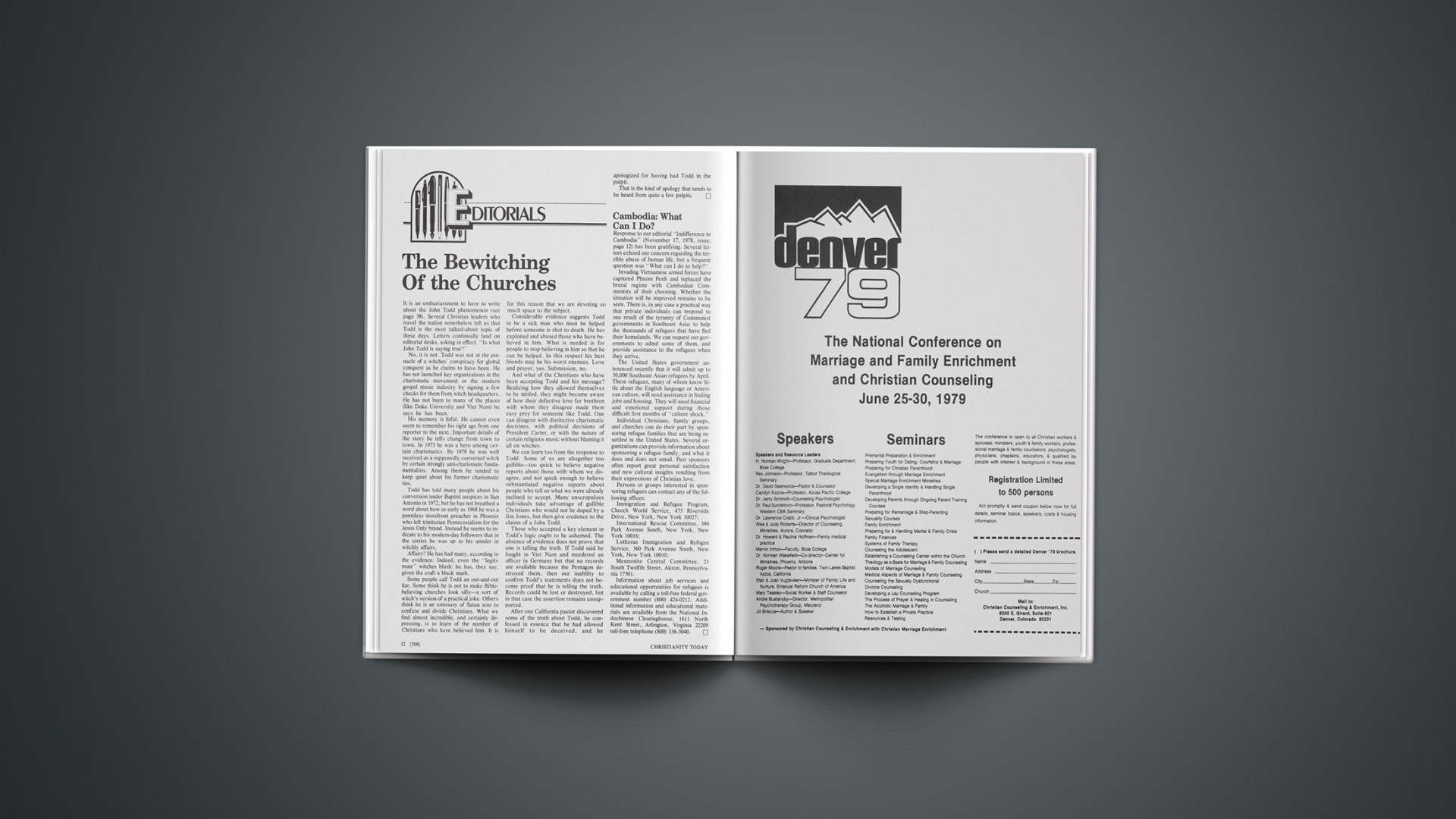It is an embarrassment to have to write about the John Todd phenomenon (see page 38). Several Christian leaders who travel the nation nonetheless tell us that Todd is the most talked-about topic of these days. Letters continually land on editorial desks, asking in effect, “Is what John Todd is saying true?”
No, it is not. Todd was not at the pinnacle of a witches’ conspiracy for global conquest as he claims to have been. He has not launched key organizations in the charismatic movement or the modern gospel music industry by signing a few checks for them from witch headquarters. He has not been to many of the places (like Duke University and Viet Nam) he says he has been.
His memory is fitful. He cannot even seem to remember his right age from one reporter to the next. Important details of the story he tells change from town to town. In 1973 he was a hero among certain charismatics. By 1978 he was well received as a supposedly converted witch by certain strongly anti-charismatic fundamentalists. Among them he tended to keep quiet about his former charismatic ties.
Todd has told many people about his conversion under Baptist auspices in San Antonio in 1972, but he has not breathed a word about how as early as 1968 he was a penniless storefront preacher in Phoenix who left trinitarian Pentecostalism for the Jesus Only brand. Instead he seems to indicate to his modern-day followers that in the sixties he was up to his amulet in witchly affairs.
Affairs? He has had many, according to the evidence. Indeed, even the “legitimate” witches blush: he has, they say, given the craft a black mark.
Some people call Todd an out-and-out liar. Some think he is out to make Bible-believing churches look silly—a sort of witch’s version of a practical joke. Others think he is an emissary of Satan sent to confuse and divide Christians. What we find almost incredible, and certainly depressing, is to learn of the number of Christians who have believed him. It is for this reason that we are devoting so much space to the subject.
Considerable evidence suggests Todd to be a sick man who must be helped before someone is shot to death. He has exploited and abused those who have believed in him. What is needed is for people to stop believing in him so that he can be helped. In this respect his best friends may be his worst enemies. Love and prayer, yes. Submission, no.
And what of the Christians who have been accepting Todd and his message? Realizing how they allowed themselves to be misled, they might become aware of how their defective love for brethren with whom they disagree made them easy prey for someone like Todd. One can disagree with distinctive charismatic doctrines, with political decisions of President Carter, or with the nature of certain religious music without blaming it all on witches.
We can learn too from the response to Todd. Some of us are altogether too gullible—too quick to believe negative reports about those with whom we disagree, and not quick enough to believe substantiated negative reports about people who tell us what we were already inclined to accept. Many unscrupulous individuals take advantage of gullible Christians who would not be duped by a Jim Jones, but then give credence to the claims of a John Todd.
Those who accepted a key element in Todd’s logic ought to be ashamed. The absence of evidence does not prove that one is telling the truth. If Todd said he fought in Viet Nam and murdered an officer in Germany but that no records are available because the Pentagon destroyed them, then our inability to confirm Todd’s statements does not become proof that he is telling the truth. Records could be lost or destroyed, but in that case the assertion remains unsupported.
After one California pastor discovered some of the truth about Todd, he confessed in essence that he had allowed himself to be deceived, and he apologized for having had Todd in the pulpit.
That is the kind of apology that needs to be heard from quite a few pulpits.










